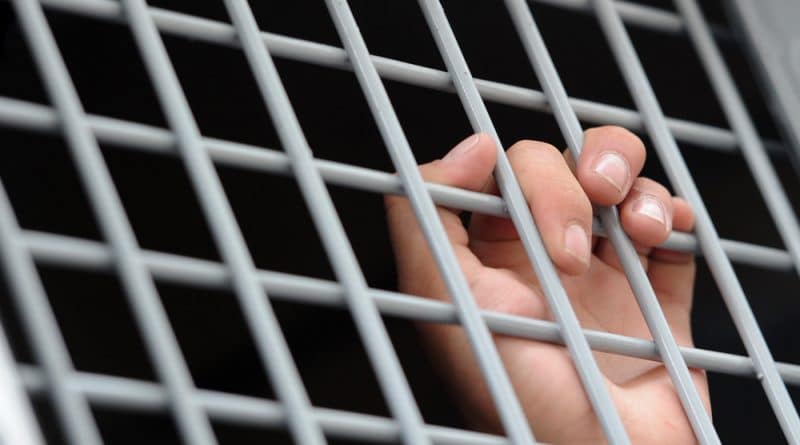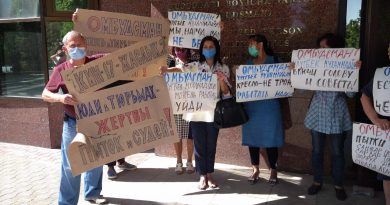In Kazakhstan, 13 political prisoners still remain in prisons
In 2019, there were 24 political prisoners in Kazakhstan. 11 of them were released from prison. Thus, by the end of the year, there were 13 people with this status in the country. Such data are provided in the report “Political prisoners and political persecution in Kazakhstan in 2019”, published by three public foundations of Kazakhstan: “Ar.Rukh.Hak” Foundation for observance of the Constitutional principles of a secular, legal, democratic state; Kazakhstan’s Bureau of Human Rights and Rule of Law; and the Public Association “We Against Torture”.
The list of political prisoners in the report contains the names of those whom ACCA actively wrote throughout the past year. They are Amangeldy Batyrbekov from Turkestan region (journalist, civil activist, editor of the newspaper “Saryagash info”), Yaroslav Golyshkin from Pavlodar (editor of the newspaper “Versiya” [“Version”]), Erlan Baltabay from Chimkent (unionist), Max Bokaev from Atyrau (human rights activist, social activist) and many others.
In the section of the report devoted to persons persecuted for religious reasons, the heroes of our publications also appeared. For example, the leaders of the church “New Life”, Maxim Maximov, Larisa Maximova and Sergey Zaikin, as well as persons involved in the so-called “case of 9 Muslims” convicted of correspondence on WhatsApp.
Another hero of our publications was also mentioned in the report. It was the leader of the unregistered association “Volunteers of the Fatherland”, human rights activist Serikzhan Bilash who advocated for the rights of ethnic Kazakhs in Xinjiang (China), who, after paying a fine of $284, was released from custody in the courtroom. Today Bilash is again engaged in human rights activities.
The list of persecuted refugees from China includes six more people. Among them, Sairagul Sautbai. She is an ethnic Kazakh who worked in the political re-education camp in Xinjiang. In April 2018, she illegally crossed the Sino-Kazakh border, after that she was detained by employees of the National Security Committee of Kazakhstan and placed in a pre-trial detention center. In October 2018, Kazakhstan refused to grant her refugee status. The woman was forced to leave for Sweden.
Bagashar Malikuly, who fled to Kazakhstan from the Xinjiang camp in January 2017, is still awaiting refugee status. In November 2019, a case was instituted against him for illegally crossing the border. However, in December, the case was closed.
The ethnic Kazakhs Tlek Tabarikuly (who is in the pre-trial detention center of Almaty), Kaster Musakhanuly and Murager Alimuly (who are in the pre-trial detention center of Ust-Kamenogorsk) are threatened with deportation back to China. They also face up to one year in prison.
The section devoted to “extremists”, among which were citizens persecuted for political reasons, does not abound in family names. However, the authors of the report note that 1579 people are on the list of “extremists”, 188 of them were included in 2019.
The authors of the report also summarized cases of violations of the rights to freedom of expression.
“In Kazakhstan, authorities are actively monitoring social networks and are taking various, including preventive measures against bloggers and activists. Single pickets with expression of opinion and publication on social networks are the basis for bringing to administrative / criminal liability,” the report says.
Following are the stories of 13 citizens who dared to express their opinion. For example, it tells about the blogger Askar Shaigumarov, whom the mayor of the city of Uralsk intimidated because he posted a video from the meeting of the mayor with the population.
There is also the story of an Almaty lawyer, Dzhokhar Utebekov, who opposed the renaming of the capital of Kazakhstan, Astana, to Nur-Sultan, for that he faced the threat of depriving him of a lawyer’s license. For a similar protest, civil activist, Raushan Torbaev, was arrested for seven days.
Another activist, Bolatbek Blyalov, who reported on a rally against the construction of a nuclear power plant in Kazakhstan, was arrested for 15 days.
The story of Aslan Sagutdinov, who held an action in Uralsk, deserves special mention. He went to the square with an empty poster to show that Kazakhstan does not have freedom of speech and democracy. After this action, Aslan was drafted, however, due to an aneurysm of the heart, he did not get into military service.
The report also mentions cases of massive Internet blockages and attempts by the Kazakh authorities to force the population to install a security certificate on their phones that allows security services to monitor citizens.
Violations of the rights of journalists were also awarded a separate chapter: detentions, arrests, intimidation, attacks, etc.
“In the reports of Freedom House in previous years and in 2019, Kazakhstan is included in the group of “not free” countries. “Changes in media laws further restricted journalists in Kazakhstan who already worked in harsh conditions.” In the annual ranking of media freedom, Kazakhstan took 158th place among 180 countries,” the report said.
Large chapters of the report are devoted to violations of the rights to peaceful assembly and to freedom of association.
“The right to peaceful assembly is guaranteed to citizens of the Republic of Kazakhstan by the Constitution and the International Covenant on Civil and Political Rights, ratified by the government of Kazakhstan in 2005. However, as practice shows, these documents are essentially only declarative in practice. Public and political associations in Kazakhstan, whose goals and objectives differ from the rhetoric of the authorities, are subjected to political persecution, despite laws and international agreements,” the authors of the report state.
The situation with torture is not the best too.
“The right not to be subjected to torture is enshrined in article 17 of the Constitution of Kazakhstan, guaranteed by the Convention against Torture, as well as the International Covenant on Civil and Political Rights. In 2017, the Republic’s Prosecutor General’s office initiated the project “To a society without torture”, which was based on the world experience in the fight against torture, but human rights activists note an inversely proportional result. After the adoption of this project, the situation with torture and cruel treatment became even worse, and for coverage of torture, human rights defenders are being prosecuted,” the report says.
So, for example, it is told how a human rights activist from Pavlodar, Elena Semenova, was fined for a post about how employees of correctional institution OB-156/15 try to silence witnesses of torture and victims. The court found the human rights activist guilty and ordered her to pay a moral damage to the prison officer in the amount of $130.
The report also cites data on cruel treatment and denial of medical care to prisoners: Mukhtar Dzhakishev, Max Bokaev, Aron Atabek, etc.
There are also facts of mass torture.
“In April 2019, troops were brought into the AK-159/6 in Dolinka village (Karaganda region). The head of the colony said that “tactical and special exercises” were held with the participation of police and the National Guard, and the situation in AK-159/6 is stable.” However, a few days later several prisoners reported the fact of mass torture: they drowned them in buckets of water, wringed their hands, beat them, threatened with sexual violence, forced them marching and “goose” stepping. In September 2019, the head of the operational department of this colony was arrested for 2 months during the investigation, but the remaining torture perpetrators were not brought to justice,” the authors of the report say.
They also remind of another fact of mass torture that occurred in April 2019 in the colony LA-155/14 in the village of Zarechny (Almaty region).
“Political prisoners Iskander Yerimbetov and Aset Abishev were tortured. Abishev received blows to the head with a baton. As a result, he suffered a serious skull injury, medical assistance was not provided. Mass torture was accompanied by complete isolation of prisoners. Payphones were turned off, and relatives and lawyers were not allowed on dates. Medical workers of the colonies did not record injuries after torture, and did not provide medical assistance. 12 prisoners reported torture. At the moment, the investigation is still ongoing, but delayed,” the report says.
The document also mentions the fact of torture of prisoner Vyacheslav Zhdanov. Recall, as ACCA reported, the prisoner was beaten in the gym of the LA-155/8 colony with loud music to muffle his screams, hanging him to the horizontal bar with twisted arms. As a result of the investigation, 7 employees of the institution were fired. The head of the institution and two of his deputies were also fired.
“After the departure of Nursultan Nazarbaev, who had been in power for 28 years, his successor, Kasym-Zhomart Tokaev, replaced him. With the change of power, civil society had certain hopes and expectations of change. At the inauguration on July 12, 2019, the President Tokaev announced the creation of a new state body of the National Council of Public Confidence (NCPC), the democratization of political processes, liberalization, and the revision of 5 laws: on rallies, political parties, the media, elections, the Parliament and the status of deputies. The image of the second President is built on reforms. However, political persecution of citizens for the exercise of their rights and freedoms continues,” the authors of the report summarize.
In conclusion, public funds called on the Kazakh authorities to release political prisoners, stop prosecuting citizens for their political, civil, religious or other views that are not aimed at violence, stop prosecuting citizens for expressing opinions and participating in peaceful meetings, and stop selective justice and political discrimination convictions, stop obstructing the activities of journalists, remove restrictions on the activities of independent trade unions and stop persecuting trade union activists, and also stop the practice of blocking the Internet for farfetched reasons.



